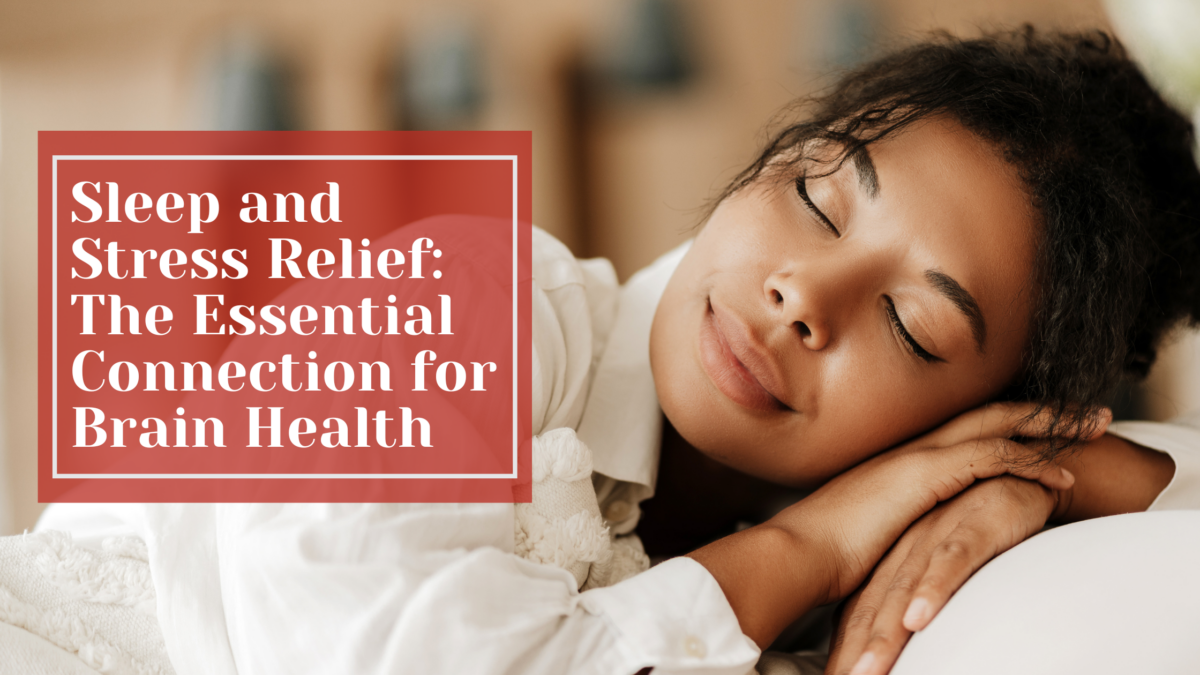
Tips for Staying Healthy as Seasons Change
October 15, 2024
Supporting Diabetes Health with Revivify Antioxidants
December 12, 2024Sleep plays a crucial role in maintaining overall health and wellness, particularly when it comes to managing stress. Quality sleep is essential for brain function, emotional regulation, and physical health, all of which are closely linked to how well we handle stress. Understanding the connection between sleep and stress relief can help you prioritize rest as a key component of your stress management routine.
The Impact of Sleep on Brain Health and Stress
Sleep is a restorative process that allows the brain to recover and prepare for the demands of the next day. During sleep, the brain undergoes several critical processes, including memory consolidation, toxin clearance, and emotional processing. Without adequate sleep, these processes are disrupted, leading to cognitive impairments, heightened stress levels, and increased susceptibility to mental health issues like anxiety and depression.
Research has shown that sleep deprivation can elevate levels of cortisol, the primary stress hormone, which can exacerbate feelings of stress and anxiety. On the other hand, getting sufficient sleep helps regulate cortisol levels, promoting a sense of calm and balance. Additionally, quality sleep enhances the brain’s ability to manage emotional responses, making it easier to cope with stressful situations.
Tips for Improving Sleep to Manage Stress
- Establish a Consistent Sleep Routine
Going to bed and waking up at the same time each day helps regulate your body’s internal clock, making it easier to fall asleep and wake up naturally. Consistency in your sleep schedule reinforces your body’s sleep-wake cycle, promoting better sleep quality. - Create a Relaxing Bedtime Environment
Your bedroom environment significantly impacts your ability to fall asleep and stay asleep. Keep your room cool, dark, and quiet. Consider using earplugs, blackout curtains, or white noise machines to create a peaceful atmosphere conducive to sleep - Limit Screen Time Before Bed
Exposure to blue light from screens can interfere with the production of melatonin, the hormone responsible for regulating sleep. Try to avoid screens at least an hour before bedtime to help your body wind down and prepare for rest. - Consider Supplements for Sleep Support
Incorporating supplements into your nighttime routine can help support relaxation and promote better sleep. Revivify’s Pro-Vitality Antioxidant Fruit Blend With Superoxide Dismutase (SOD) is designed to reduce oxidative stress, which can interfere with sleep quality. This blend also supports overall brain health, making it a valuable addition to your stress management and sleep routine.

Recommended Amount of Sleep by Age
- Infants (4-12 months): 12-16 hours per day (including naps)
- Toddlers (1-2 years): 11-14 hours per day (including naps)
- Preschoolers (3-5 years): 10-13 hours per day (including naps)
- School-Age Children (6-12 years): 9-12 hours per day
- Teens (13-18 years): 8-10 hours per day
- Adults (18-60 years): 7 or more hours per night
- Older Adults (61-64 years): 7-9 hours per night
- Seniors (65+ years): 7-8 hours per night

Revivify products, including the Pro-Vitality Antioxidant Fruit Blend, are recommended for individuals aged 12 and up. This makes them a suitable option for teens and adults looking to enhance their sleep quality and manage stress more effectively.
Prioritize Sleep for Better Stress Management
Quality sleep is a cornerstone of effective stress management. By understanding the importance of sleep for brain health and incorporating practices that promote restful sleep, you can significantly reduce stress levels and improve your overall well-being. Pairing these practices with Revivify’s antioxidant-rich supplements can provide an added layer of support, helping you to navigate the challenges of modern life with greater ease and resilience.
For more tips on managing stress and improving sleep, explore the full range of Revivify products and resources on Revivify’s website.




